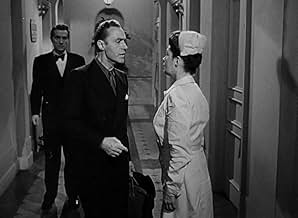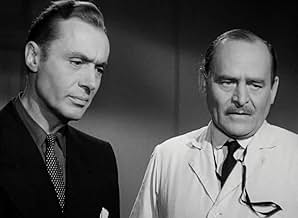París, 1938. El doctor Ravic es un médico austriaco que, huyendo del nazismo, se refugia en la capital francesa. Allí entabla amistad con Boris, que trabaja como portero de un local. Una noc... Leer todoParís, 1938. El doctor Ravic es un médico austriaco que, huyendo del nazismo, se refugia en la capital francesa. Allí entabla amistad con Boris, que trabaja como portero de un local. Una noche Ravic tropieza en la calle con una mujer, JoanParís, 1938. El doctor Ravic es un médico austriaco que, huyendo del nazismo, se refugia en la capital francesa. Allí entabla amistad con Boris, que trabaja como portero de un local. Una noche Ravic tropieza en la calle con una mujer, Joan
- Dirección
- Guión
- Reparto principal
- Premios
- 3 premios en total
- Gestapo Agent
- (sin acreditar)
- Milan Charwoman
- (sin acreditar)
- Newsboy
- (sin acreditar)
- Cashier
- (sin acreditar)
- Scheherazade's Waiter
- (sin acreditar)
Reseñas destacadas
For those not familiar with Remarque's novel, it's a must-read--although I warn you, after you're done you will have an insane urge to try Calvados.
Wow, what a difficult movie to assess, but not a difficult one to enjoy. On the one hand, it is dripping with mood and anxiety. It is about budding love and broken hearts. There is political intrigue and and incipient Nazi invasion. And it's France, Paris, center of the end of the great century of European art and culture, from the mid 1800s to the mid 1900s.
On the other hand, it seems amorphous and vague.
Director Lewis Milestone makes this 1938 Paris gloomier than Sherlock Holmes's London--the rain, the darkness, the general lack of hope is part of the great drama lurking behind every scene. Charles Boyer is the main character, a refugee of uncertain origin, and the mysterious woman with both rich and poor friends and an equally uncertain origin is played in usual melodrama by Ingrid Bergman. They have no chemistry, for sure, but that just makes their love affair mysterious as well. In fact, the whole movie is about what we don't know, and can't know by watching.
This could be frustrating for some viewers, this lack of intention, and frankly lack of clear plot. But if you can just inhabit this world, enjoying a highly polished mise-en-scene (so polished it shows its Hollywood sound stage roots, at times, though darkly, darkly), if you can just soak it up and not worry, all will be well. It's a beautiful beautiful movie on those terms, photographer Russell Meety is doing that 1940s high contrast photography to perfection. Watch how often he shoots through windows, including the great phone booth shot (repeated ten minutes later) where the accident happens in the background.
The story here is based on a 1945 novel by German author Erich Maria Remarque, and Milestone directed the legendary "All Quiet on the Western Front" two decades earlier, also based on a Remarque novel. In both cases, there is an intensity of humanity against the larger military chaos and cruelty that seems so indifferent to them. The book here was actually published in English first as "The Arch of Triumph," and was a huge bestseller before going to a German version.
I don't think it's an accident that the pre-war angst here is an echo of "Casablanca," which by now (five years later) was already legendary. Bergman, of course, is carried over (though she had just finished filming "Notorious" for Hitchcock, if you want to follow her career). And Boyer is a better version of Henried (better as an actor). For more colorful secondary characters, you'll find the incomparable Louis Calhern (with a surprisingly effective accent) and Charles Laughton (whose accent is wobbly).
This was originally a more gut wrenching four hour film, and I think it might have made more logical sense at that length, but I can see it would have been too long by far. Watch what we have and just take it in for what it is. I enjoyed it on that level very very much.
Boyer, normally a middle of the road actor, does well enough here to overshadow even the great Ingrid Bergman (they had been paired together in GASLIGHT, 1944, and she had won an Oscar for that performance). I think that happened because by this point Bergman had already met, and fallen in love with, Roberto Rosselini, and that must have distracted her no end (her character even claims to be Italian, and she speaks Italian toward the end of the film). That emotional upheaval, which was about to have serious consequences for her career, pushing her out of Hollywood for about 8 years, definitely impacted on her acting in this film, and on the latter's quality.
In the end, it is the film's dark atmosphere that stays with you - and that's not much. Still, I am glad I watched it, it is better than many supposedly politically correct movies done today.
¿Sabías que...?
- CuriosidadesThe rough cut of the film ran four hours. In reducing it to two hours, several actors were cut, including Ruth Warrick. She does appear briefly in the restored 133-minute version.
- PifiasWhen Ravic takes his gun and goes to look for Haake in the streets, the first shot of him has been reversed for some reason as evidenced by the signs he passes, which are backwards.
- Citas
Joan Madou: He wanted to kill me. They always talk about it but they never do.
[laughs]
Joan Madou: You wouldn't want to kill me.
- ConexionesFeatured in Legendy mirovogo kino: Charles Boyer
- Banda sonoraLong After Tonight
(1948) (uncredited)
Music by Rudolph Polk
Music by adapted from the Russian folk song "Prochlada"
Lyrics by Ervin Drake and Jimmy Shirl
Sung by an uncredited singer dubbing Ingrid Bergman at the Scheherazade casino
Selecciones populares
- How long is Arch of Triumph?Con tecnología de Alexa
Detalles
Taquilla
- Presupuesto
- 5.000.000 US$ (estimación)
- Duración
- 2h(120 min)
- Color
- Relación de aspecto
- 1.37 : 1


























